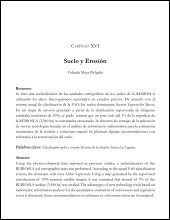| dc.contributor | FERNANDO LUIS GARCIA CARREÑO | |
| dc.creator | BETSAIDA BIBO VERDUGO | |
| dc.date | 2014-10-17 | |
| dc.identifier | http://cibnor.repositorioinstitucional.mx/jspui/handle/1001/159 | |
| dc.identifier.uri | http://dspace.cibnor.mx:8080/handle/123456789/2467 | |
| dc.description | Las enzimas adaptadas al frío son sintetizadas por los organismos ectotermos que habitan ambientes de baja temperatura para asegurar su desempeño fisiológico. Estas enzimas son de gran interés biotecnológico debido a que poseen mayor eficiencia catalítica y menor estabilidad térmica que sus homólogos de organismos adaptados a temperaturas superiores; se ha sugerido que una mayor flexibilidad estructural es responsable de dichas características. La langosta americana (Homarus americanus) es un organismo ectotermo cuyo hábitat marino varía en temperatura en el rango de 0-25 °C, y por lo tanto la síntesis de peptidasas digestivas adaptadas al frío es indispensable para asegurar un nivel suficiente de proteólisis digestiva. La proteólisis digestiva en la langosta americana se basa en peptidasas de las clases aspártico y cisteíno. En estudios anteriores se ha demostrado que la aspártico peptidasa catepsina D1 del jugo gástrico de la langosta americana, en comparación con la catepsina D bovina, posee mayor eficiencia catalítica en el rango de 4-25 °C. En este trabajo se investigó si la catepsina D1 es una enzima adaptada al frío con base en estudios de activación termodinámica, estabilidad y especificidad por sustrato de la enzima purificada del jugo gástrico. Con fines comparativos se incluyeron homólogos de organismos endotermos, la catepsina D bovina y la pepsina gástrica porcina. La tasa de recambio (kcat) de la catepsina D1 es mayor que la de sus homólogos de bovino y de porcino en el rango de 5 a 55 °C. La mayor eficiencia catalítica de la catepsina D1 de la langosta también se manifestó en una menor energía de activación del complejo enzima-sustrato (G#) [...] | |
| dc.description | Cold-adapted enzymes are the main molecular adaptive strategy of ectothermic animals inhabiting cold environments to achieve normal metabolic rates. Cold-adapted enzymes are of high biotechnological value, given their high catalytic efficiency and low thermal stability in comparison to homologous enzymes from organisms adapted to warmer temperatures, a higher flexible structure could be responsible for such characteristics. The American lobster (Homarus americanus) is an ectothermic animal which marine habitat varies on temperature in the range 0-25 °C; therefore, the synthesis of cold-adapted digestive peptidases is required for digestive proteolysis. Previous investigations have shown that the aspartic peptidase cathepsin D1 from the gastric juice of the American lobster is catalytically more efficient in the temperature range of 4–25 °C compared to bovine cathepsin D. The aim of this work was to determine if lobster cathepsin D1 is a cold-adapted enzyme. We investigated the enzyme thermodynamic activation, its stability and its specificity. Homologous enzymes such as the bovine cathepsin D and the porcine pepsin were included for comparison. First, we calculated the Michaelis-Menten kinetic parameters of the lobster enzyme in the temperature range of 5–55 °C. The lobster cathepsin D had a higher catalytic constant (kcat) compared to the homologous bovine and porcine enzymes in the full experimental temperature range. Cathepsin D1 also had a lower Gibbs activation energy of the enzyme-substrate complex (G#) [...] | |
| dc.format | application/pdf | |
| dc.language | spa | |
| dc.publisher | Centro de Investigaciones Biológicas del Noroeste, S.C. | |
| dc.rights | info:eu-repo/semantics/openAccess | |
| dc.rights | http://creativecommons.org/licenses/by-nc-nd/4.0 | |
| dc.subject | info:eu-repo/classification/AUTOR/catepsina D1; langosta americana; Homarus americanus; Estudio de activación termodinámica; estabilidad; especificidad | |
| dc.subject | info:eu-repo/classification/cti/2 | |
| dc.subject | info:eu-repo/classification/cti/24 | |
| dc.subject | info:eu-repo/classification/cti/2401 | |
| dc.subject | info:eu-repo/classification/cti/240113 | |
| dc.subject | info:eu-repo/classification/cti/240113 | |
| dc.title | La catepsina D1 de la langosta americana, Homarus americanus: estudio de activación termodinámica, estabilidad y especificidad | |
| dc.type | info:eu-repo/semantics/masterThesis | |

